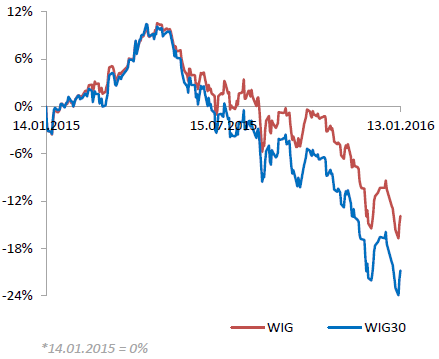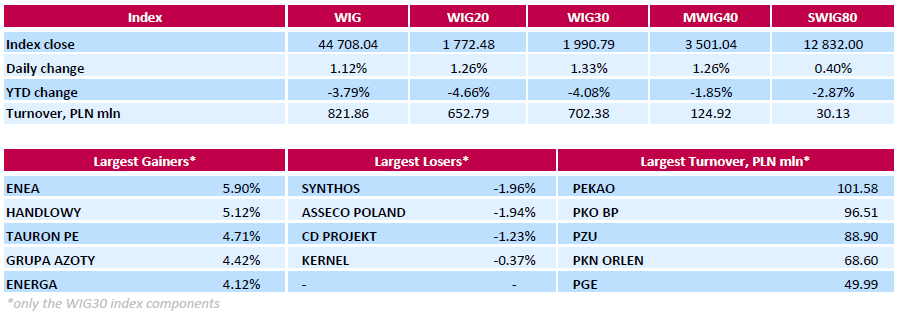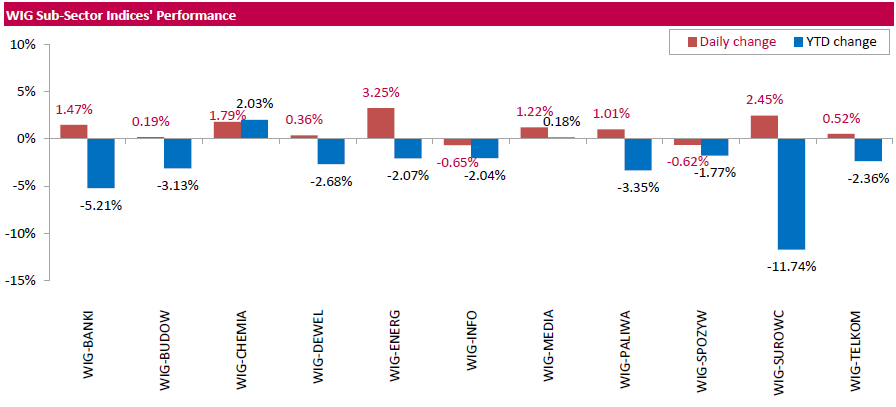Noticias del mercado
-
21:00
Dow -1.93% 16,197.06 -319.16 Nasdaq -2.88% 4,551.07 -134.85 S&P -2.16% 1,896.79 -41.89
-
18:21
Dallas Fed President Robert Kaplan: 3-4 interest rate hikes this year is “a reasonable base case”
Dallas Fed President Robert Kaplan said in an interview with Bloomberg Television on Wednesday that he would have "bias" to continue the normalisation.
"I would have a bias to want to move toward normalization. It comes with some risk. Every time we increase the federal funds rate, we're going to have to watch and see what the impact is," he said.
Kaplan noted that officials should analyse and understand recent turmoil in international markets, and should not overreact.
He noted that market turbulences may not reflect the U.S. economy.
Dallas Fed president pointed out that he thinks 3-4 interest rate hikes this year is "a reasonable base case".
-
18:13
Wall Street. Major U.S. stock-indexes fell
Major U.S. stock-indexes fell on Wednesday. China exports fell just 1.4% in December, much less than the expected 8% drop. A 4% fall in imports was also much smaller than many had feared. Crude prices were up for the first time in eight days, also helped by a surprise decline in U.S. inventories. Oil briefly fell below the widely watched $30-per-barrel level on Tuesday.
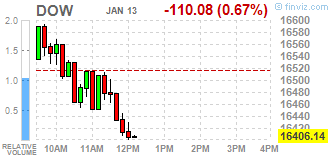
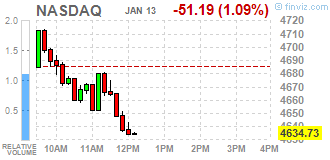
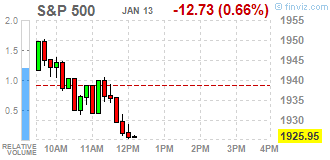
Most of Dow stocks in negative area (20 of 30). Top looser - E. I. du Pont de Nemours and Company (DD, -2,20%). Top gainer - Exxon Mobil Corporation (XOM, +1.26%).
Almost all of S&P sectors in negative area. Top looser - Services (-1,0%). Top gainer - Utilities (+0,5%).
At the moment:
Dow 16320.00 -43.00 -0.26%
S&P 500 1919.25 -5.75 -0.30%
Nasdaq 100 4285.75 -27.00 -0.63%
Oil 30.48 +0.04 +0.13%
Gold 1091.60 +6.40 +0.59%
U.S. 10yr 2.10 +0.00
-
18:06
Boston Fed President Eric Rosengren: further interest rates will be gradual and depend on the incoming economic data
Boston Fed President Eric Rosengren said in a speech on Wednesday that further interest rates will be gradual and depend on the incoming economic data.
"The future path of the federal funds rate will depend on incoming economic data… Further increases in rates are in my view likely to be gradual," he said.
Rosengren noted that there are downside risks to further interest rate hikes.
"While the median forecast provides a reasonable estimate of the likely path of the federal funds rate, my own view is that such a forecast does have downside risks. These downside risks reflect continued headwinds from weakness within countries that represent many of our major trading partners," Boston Fed president said.
"Further tightening will require data continuing to be strong enough that growth will be at or above potential, so that Federal Reserve policymakers can be confident that inflation will reach our 2 percent target," he added.
Rosengren is a voting member of the Federal Open Market Committee (FOMC) this year.
-
18:03
WSE: Session Results
Polish equity market continued to march upwards on Wednesday. The broad market benchmark, the WIG index, rose by 1.12%. Almost all sectors in the WIG generated positive returns. The exception were informational technology (-0.65%) and food (-0.62%) sectors. At the same time, utilities (+3.25%) and materials (+2.45%) were the best-performers.
The large-cap stocks' measure, the WIG30 Index, advanced 1.33%. In the WIG30 index basket, gencos ENEA (WSE: ENA), TAURON PE (WSE: TPE) and ENERGA (WSE: ENG) were among the biggest advancers, climbing by a respective 5.9%, 4.71% and 4.12% after drastic drops in recent months. Other most prominent risers were bank HANDLOWY (WSE: BHW) and chemical company GRUPA AZOTY (WSE: ATT), gaining 5.12% and 4.42% respectively. On the other side of the ledger, chemical producer SYNTHOS (WSE: SNS) and IT-company ASSECO POLAND (WSE: ACP) were the worst-performing names, slumping 1.96% and 1.94% respectively.
-
18:00
European stocks close: stocks closed mixed as oil prices traded higher and on the better-than-expected Chinese trade data
Stock indices traded mixed as oil prices traded higher and on the better-than-expected Chinese trade data. The Chinese Customs Office released its trade data on Wednesday. China's trade surplus climbed to $58.2 billion in December from $54.1 billion in November, beating expectations for a decline to a surplus of $53.0 billion. Exports fell at an annual rate of 1.4% in December, while imports slid at an annual rate of 7.6%, the fourteenth consecutive decline. In yuan denomination, exports climbed 2.3% in December, while imports dropped 4.0%.
Meanwhile, the economic data from the Eurozone was weaker than expected. Eurostat released its industrial production data for the Eurozone on Wednesday. Industrial production in the Eurozone dropped 0.7% in November, missing expectations for a 0.3% decrease, after a 0.8% rise in October. October's figure was revised up from a 0.6% increase.
The fall was driven by declines in durable consumer goods, energy and capital output.
On a yearly basis, Eurozone's industrial production gained 1.1% in November, missing expectations for a 1.3% rise, after a 2.0% increase in October. October's figure was revised up from a 1.9% gain.
The increase was mainly driven by rises in durable consumer goods, non-durable consumer goods, intermediate goods output and capital goods.
The German Finance Ministry said on Wednesday that the country's budget surplus was €12.1 billion in 2015, up from the previous forecast of a €6.1 billion surplus. The surplus was driven by strong tax revenues and one-off effects.
German Finance Minister Wolfgang Schäuble said that he expects a balanced budget in 2016 if the domestic labour market will remain robust. He added that the surplus will be used to cover migration-related costs.
Indexes on the close:
Name Price Change Change %
FTSE 100 5,960.97 +31.73 +0.54 %
DAX 9,960.96 -24.47 -0.25 %
CAC 40 4,391.94 +13.19 +0.30 %
-
16:49
German Finance Ministry’s monthly report: the economy is expected to expand moderately, driven by private consumption
The German Finance Ministry said in its monthly report on Wednesday that it expects the economy to expand moderately, driven by private consumption.
"The German economy is moderately tilted to the upside, but it can't completely escape the bumpy global economic environment," the ministry said.
-
16:41
Germany’s budget surplus in 2015 is higher than previously expected
The German Finance Ministry said on Wednesday that the country's budget surplus was €12.1 billion in 2015, up from the previous forecast of a €6.1 billion surplus. The surplus was driven by strong tax revenues and one-off effects.
German Finance Minister Wolfgang Schäuble said that he expects a balanced budget in 2016 if the domestic labour market will remain robust. He added that the surplus will be used to cover migration-related costs.
-
16:24
European Central Bank (ECB) Executive Board member Peter Praet: effect of low oil prices on inflation in the Eurozone is not temporary
European Central Bank (ECB) Executive Board member Peter Praet said in an interview with the German newspaper Süddeutsche Zeitung that effect of low oil prices on inflation in the Eurozone is not temporary.
"Although falling oil prices have recently played a significant role in low inflation, the effect on inflation is not negligible or temporary," he said.
Praet pointed out that the ECB's stimulus measures helped to stop a decline in inflation expectations and to reduce the risk of deflation.
He noted that governments should implement structural reforms.
-
16:09
Swiss National Bank Vice Chairman Fritz Zurbruegg: price stability is important for competitiveness of companies
The Swiss National Bank (SNB) Vice Chairman Fritz Zurbruegg said on Wednesday that price stability is important for competitiveness of companies.
"By fulfilling its mandate and ensuring price stability, the SNB makes an indirect contribution to the competitiveness of the Swiss economy," he said.
Zurbruegg added that "there is no contradiction between a strong currency and an economy's competitiveness" in the long term.
Zurbruegg noted that the Swiss franc is overvalued, and it is necessary for the central bank to impose negative interest rates and to intervene in the foreign exchange market.
-
15:33
U.S. Stocks open: Dow +0.34%, Nasdaq +0.42%, S&P +0.44%
-
15:24
Before the bell: S&P futures +0.88%, NASDAQ futures +0.86%
U.S. stock-index futures increased.
Global Stocks:
Nikkei 17,715.63 +496.67 +2.88%
Hang Seng 19,934.88 +223.12 +1.13%
Shanghai Composite 2,950.21 -72.65 -2.40%
FTSE 6,001.51 +72.27 +1.22%
CAC 4,444.02 +65.27 +1.49%
DAX 10,097.33 +111.90 +1.12%
Crude oil $31.55 (+3.65%)
Gold $1081.60 (-0.33%)
-
15:15
The Federation of German Industries (BDI) expects the German economy to expand around 2% in 2016
The Federation of German Industries (BDI) said on Wednesday that it expects the German economy to expand around 2% in 2016.
BDI President Ulrich Grillo said that the growth is driven by low oil prices, low interest rates and a weak euro, adding that geopolitical tensions could have a negative effect on the German economy.
He noted that the government should invest in the infrastructure.
-
15:00
Moderate growth in the Eurozone is expected in the first and second quarter of 2016
The German IFO, the French Insee and the Italian Istat institutes said in its survey on Tuesday that the economy in the Eurozone is expected to continue to recover moderately. Real gross domestic product (GDP) is expected to rise by 1.5% in 2015, and by 0.4% in the first and second quarter of 2016. The growth will be driven by private consumption.
According to IFO, Insee, and Istat, inflation in the Eurozone is expected to be 0.5% year-on-year in the first quarter of 2016 and 0.4% year-on-year in the second quarter of 2016. Low energy prices weigh on inflation.
Downside risks to the Eurozone's economy are geopolitical tensions in the Middle East and the ongoing structural transformation of the Chinese economy, the survey said.
-
14:59
Wall Street. Stocks before the bell
(company / ticker / price / change, % / volume)
General Motors Company, NYSE
GM
31.68
4.55%
103.9K
Freeport-McMoRan Copper & Gold Inc., NYSE
FCX
4.26
3.65%
50.9K
AMERICAN INTERNATIONAL GROUP
AIG
59.60
2.83%
18.5K
Microsoft Corp
MSFT
54.10
2.50%
345.5K
Yandex N.V., NASDAQ
YNDX
13.29
1.53%
0.8K
ALCOA INC.
AA
7.38
1.37%
36.0K
Twitter, Inc., NYSE
TWTR
19.88
1.33%
14.8K
Nike
NKE
60.60
1.10%
9.8K
Chevron Corp
CVX
83.00
1.03%
1.5K
Exxon Mobil Corp
XOM
75.95
1.00%
37.0K
Facebook, Inc.
FB
100.33
0.97%
162.3K
FedEx Corporation, NYSE
FDX
136.00
0.96%
0.1K
Amazon.com Inc., NASDAQ
AMZN
623.40
0.89%
7.6K
Yahoo! Inc., NASDAQ
YHOO
30.95
0.85%
4.8K
Boeing Co
BA
133.00
0.82%
7.3K
Citigroup Inc., NYSE
C
47.25
0.79%
2.4K
JPMorgan Chase and Co
JPM
59.39
0.73%
1.5K
Tesla Motors, Inc., NASDAQ
TSLA
211.50
0.73%
2.8K
Starbucks Corporation, NASDAQ
SBUX
59.88
0.71%
9.3K
Caterpillar Inc
CAT
62.03
0.70%
0.2K
General Electric Co
GE
28.83
0.66%
15.6K
Apple Inc.
AAPL
100.62
0.66%
159.6K
The Coca-Cola Co
KO
42.38
0.62%
21.4K
Google Inc.
GOOG
730.32
0.59%
5.0K
Pfizer Inc
PFE
31.18
0.58%
1.1K
3M Co
MMM
141.65
0.56%
1.3K
Goldman Sachs
GS
166.60
0.54%
0.2K
Walt Disney Co
DIS
102.00
0.53%
5.1K
Intel Corp
INTC
32.84
0.49%
1.7K
Verizon Communications Inc
VZ
45.15
0.49%
2.8K
Home Depot Inc
HD
128.09
0.47%
3.2K
Visa
V
75.10
0.45%
1.5K
International Business Machines Co...
IBM
133.50
0.45%
0.5K
AT&T Inc
T
34.04
0.41%
10.2K
Cisco Systems Inc
CSCO
25.45
0.39%
0.8K
Merck & Co Inc
MRK
51.90
0.27%
0.1K
ALTRIA GROUP INC.
MO
59.54
0.27%
140.8K
Johnson & Johnson
JNJ
98.50
0.26%
2.0K
Wal-Mart Stores Inc
WMT
63.76
0.22%
0.3K
Procter & Gamble Co
PG
76.66
0.20%
0.4K
Travelers Companies Inc
TRV
108.00
0.02%
1.7K
Ford Motor Co.
F
12.68
-1.32%
430.9K
American Express Co
AXP
63.50
-1.40%
5.8K
Barrick Gold Corporation, NYSE
ABX
7.77
-1.65%
8.2K
-
14:55
Upgrades and downgrades before the market open
Upgrades:
Microsoft (MSFT) upgraded to Overweight from Equal-Weight at Morgan Stanley; target raised to $66 from $57
Downgrades:
American Express (AXP) downgraded to Neutral from Buy at Goldman
Other:
Twitter (TWTR) initiated with a Neutral at Mizuho; target $21
American Express (AXP) initiated with a Neutral at DA Davidson; target $70
-
14:37
Richmond Fed President Jeffrey Lacker: turmoil in China has no effect on the U.S. economy
Richmond Fed President Jeffrey Lacker said on Tuesday that turmoil in China has no effect on the U.S. economy.
"I think our real economies are linked less than you would think from the extent to which our equity markets seem to have moved in parallel with movements in their exchange rate and their equity markets," he said.
Lacker noted the U.S. stock market's volatility "looks like an overreaction".
Lacker is not a voting member of the Federal Open Market Committee (FOMC) this year.
-
12:00
European stock markets mid session: stocks traded higher as oil prices rebounded and on the better-than-expected Chinese trade data
Stock indices traded higher as oil prices rebounded and on the better-than-expected Chinese trade data. The Chinese Customs Office released its trade data on Wednesday. China's trade surplus climbed to $58.2 billion in December from $54.1 billion in November, beating expectations for a decline to a surplus of $53.0 billion. Exports fell at an annual rate of 1.4% in December, while imports slid at an annual rate of 7.6%, the fourteenth consecutive decline. In yuan denomination, exports climbed 2.3% in December, while imports dropped 4.0%.
Meanwhile, the economic data from the Eurozone was weaker than expected. Eurostat released its industrial production data for the Eurozone on Wednesday. Industrial production in the Eurozone dropped 0.7% in November, missing expectations for a 0.3% decrease, after a 0.8% rise in October. October's figure was revised up from a 0.6% increase.
The fall was driven by declines in durable consumer goods, energy and capital output.
On a yearly basis, Eurozone's industrial production gained 1.1% in November, missing expectations for a 1.3% rise, after a 2.0% increase in October. October's figure was revised up from a 1.9% gain.
The increase was mainly driven by rises in durable consumer goods, non-durable consumer goods, intermediate goods output and capital goods.
Current figures:
Name Price Change Change %
FTSE 100 6,003.11 +73.87 +1.25 %
DAX 10,119.98 +134.55 +1.35 %
CAC 40 4,454.61 +75.86 +1.73 %
-
11:43
Greek consumer prices increase 0.1% in December
The Hellenic Statistical Authority released its consumer price inflation data for Greece on Wednesday. Greek consumer prices increased 0.1% in December, after the 0.8% drop in November.
On a yearly basis, the Greek consumer price index declined 0.2% in December, after a 0.7 fall in November. Consumer prices in Greece declined since March 2013.
Housing prices plunged at an annual rate of 3.6% in December, transport costs dropped by 2.1%, clothing and footwear prices were up 0.8%, while household equipment prices were down 1.7%.
Prices of food and non-alcoholic beverages climbed at an annual rate of 2.8% in December, while alcoholic beverages and tobacco prices increased by 1.4%.
-
11:29
France’s current account deficit is €1.4 billion in November
The Bank of France released its current account data on Wednesday. France's current account deficit was €1.4 billion in November, down from a deficit of €1.0 billion in October. October's figure was revised up from a deficit of €1.4 billion.
The trade goods deficit narrowed to €2.9 billion in November from €3.0 billion in October, while the surplus on services fell to €800 billion from €1.3 billion.
-
11:22
Eurozone’s industrial production drops 0.7% in November
Eurostat released its industrial production data for the Eurozone on Wednesday. Industrial production in the Eurozone dropped 0.7% in November, missing expectations for a 0.3% decrease, after a 0.8% rise in October. October's figure was revised up from a 0.6% increase.
The fall was driven by declines in durable consumer goods, energy and capital output. Durable consumer goods output fell 1.0% in November, capital goods output dropped 1.9%, while energy output plunged 4.3%.
Intermediate goods output was up 0.7% in November, while non-durable consumer goods were up 0.1%.
On a yearly basis, Eurozone's industrial production gained 1.1% in November, missing expectations for a 1.3% rise, after a 2.0% increase in October. October's figure was revised up from a 1.9% gain.
The increase was mainly driven by rises in durable consumer goods, non-durable consumer goods, intermediate goods output and capital goods. Durable consumer goods climbed by 1.7% in November from a year ago, capital goods rose by 1.2%, non-durable consumer goods gained by 1.2%, while intermediate goods output increased by 2.1%.
Energy output declined by 2.8% in November from a year ago.
-
10:47
French consumer price inflation rises 0.2% in December
The French statistical office Insee released its consumer price inflation for France on Wednesday. The French consumer price inflation rose 0.2% in December, exceeding expectations for a 0.1% gain, after a 0.2% fall in November.
On a yearly basis, the consumer price index increased 0.2% in December, after a flat reading in November.
Fresh food prices rose 3.1% year-on-year in December, services prices climbed by 1.1%, while petroleum products prices dropped by 9.7%.
-
10:03
China's trade surplus climbs to $58.2 billion in December
The Chinese Customs Office released its trade data on Wednesday. China's trade surplus climbed to $58.2 billion in December from $54.1 billion in November, beating expectations for a decline to a surplus of $53.0 billion.
Exports fell at an annual rate of 1.4% in December, while imports slid at an annual rate of 7.6%, the fourteenth consecutive decline.
In yuan denomination, exports climbed 2.3% in December, while imports dropped 4.0%.
-
07:07
Global Stocks: U.S. stock indices advanced
U.S. stock indices rose on Tuesday as gains in technology and health-care stocks outweighed declines in oil.
The Dow Jones Industrial Average rose 117.65 points, or 0.7%, to 16,516.22. The S&P 500 climbed 15.01 point, or 0.8%, to 1,938.68 (8 out of its 10 sectors advanced). The Nasdaq Composite gained 47.93 points, or 1%, to 4,685.92.
The U.S. National Federation of Independent Business reported that small business confidence slightly improved in December, but remained quite weak. The small business confidence index rose to 95.2 points from 94.8 in November. The reading is below the long-term average of 98.0 points. Economists had expected a reading of 95.4.
Investors also paid attention to comments by Nigerian oil minister, who said that some OPEC members were calling for an emergency meeting. This week analysts from Barclays, Macquarie and Bank of America Merrill Lynch revised down their 2016 oil price forecasts.
This morning in Asia Hong Kong Hang Seng gained 2.22%, or 438.33, to 20,150.09. China Shanghai Composite Index declined 0.47%, or 14.19, to 3,008.67. The Nikkei rose 2.49%, or 429.40, to 17,648.36.
Asian stocks traded mixed. Japanese stocks rose after a six-day decline. Gains in Wall Street and a weaker yen supported stocks.
-
03:28
Nikkei 225 17,602.75 +383.79 +2.23 %, Hang Seng 20,027.11 +315.35 +1.60 %, Shanghai Composite 3,034.49 +11.63 +0.38 %
-
01:03
Stocks. Daily history for Sep Jan 12’2016:
(index / closing price / change items /% change)
Nikkei 225 17,218.96 -479.00 -2.71 %
Hang Seng 19,711.76 -176.74 -0.89 %
Shanghai Composite 3,023.19 +6.48 +0.21 %
FTSE 100 5,929.24 +57.41 +0.98 %
CAC 40 4,378.75 +66.01 +1.53 %
Xetra DAX 9,985.43 +160.36 +1.63 %
S&P 500 1,938.68 +15.01 +0.78 %
NASDAQ Composite 4,685.92 +47.93 +1.03 %
Dow Jones 16,516.22 +117.65 +0.72 %
-
